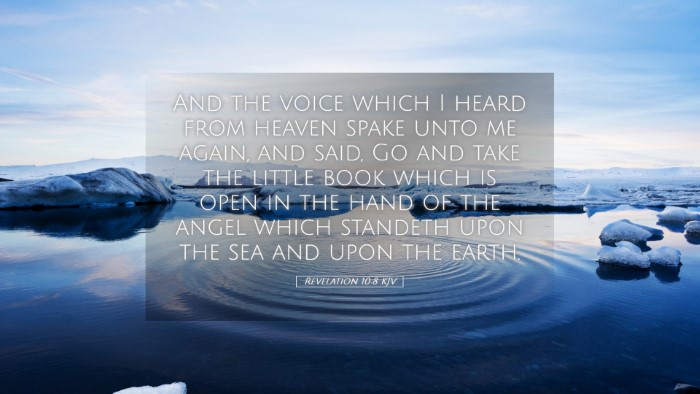Commentary on Revelation 10:8
Text of the Verse (Revelation 10:8): "Then the voice which I heard from heaven spoke to me again, and said, 'Go, take the little scroll that is open in the hand of the angel who is standing on the sea and on the land.'"
Introduction
The intricate visions of the Book of Revelation call for profound reflection and analysis, particularly as they reflect theological significance and prophetic insight. Revelation 10:8 is a pivotal moment that offers deep implications for understanding divine communication and John’s role as a prophet. This commentary synthesizes insights from Matthew Henry, Albert Barnes, and Adam Clarke, providing a multi-faceted exploration of this scripture.
Contextual Overview
The context of Revelation 10 is crucial as it reveals a pause in the sequence of trumpet judgments, signaling a change and offering insight into the heavenly realm. Matthew Henry notes that the interlude serves as a reminder of the sovereignty of God amidst earthly turmoil.
- Divine Communication: The narrative begins with a voice from heaven, reiterating the importance of heavenly authority. This voice is significant, as it directs John to engage with the angel and the scroll.
- The Role of the Angel: The angel, standing on both sea and land, symbolizes dominion over all creation. Albert Barnes points out that this imagery highlights the angel's commanding presence, embodying God's authority over the earth and the sea.
Analysis of Key Elements
The Voice from Heaven
According to Adam Clarke, the mention of a voice from Heaven reminds believers of ongoing divine communication, emphasizing that God actively engages with His creation. The voice’s persistence reflects God’s commitment to impart knowledge and guidance.
The Little Scroll
The scroll, described as "little," has generated extensive interpretation. Matthew Henry describes it as containing messages that provoke both prophecy and lamentation. The scroll serves as a tangible representation of divine revelation, compelling John—and the reader—to assimilate its contents.
John's Commission
The command given to John is significant—it involves action and dedication to receiving God's message. Albert Barnes emphasizes that being tasked with taking the scroll signifies John's active participation in God's plan. This also embodies a call for prophetic responsibility in relaying God's truth.
Theological Implications
Revelation 10:8 invites an exploration of key theological tenets.
- Revelation and Prophecy: The act of receiving the scroll signifies an enduring principle: divine revelation necessitates human response. The scroll's contents may highlight messages of judgment and grace, reminding us that understanding God's will involves a transformative process.
- Covenantal Relationship: John’s obedient stance to collect the scroll signifies the covenantal relationship between God and His people. Adam Clarke articulates that believers are called not only to hear but to act upon the divine directive, reinforcing the interactive nature of faith.
- God's Sovereignty: The depiction of the angel on land and sea further solidifies the theological premise of God as sovereign over all realms. This assurance encourages believers amidst adversity, affirming the unshakeable nature of God’s kingdom.
Practical Applications
This verse holds practical significance for pastors, students, and theologians alike as they sift through its theological and practical implications.
- Listening to God's Voice: Pastoral applications emphasize the necessity of attuning ourselves to God’s voice amidst the cacophony of life. Just as John responded to the divine call, we too are encouraged to cultivate sensitivity to God’s leading.
- Embracing Prophetic Role: Students of theology are invited to embrace their roles as contemporary prophets, carrying forth the messages entrusted to them. The call to action is a reminder of the responsibilities tied to receiving divine revelation.
- Reporting the Revelation: The church is called to actively engage in the transformative messages found within Scripture, drawing believers back to the essential truths that shape their faith journeys.
Conclusion
Revelation 10:8 serves as a powerful reminder of the ongoing dialogue between God and humanity. The interaction between John and the angel embodies the dynamic and active engagement that characterizes the life of faith. The synthesis of insights from Henry, Barnes, and Clarke conveys a multidimensional understanding of this scripture, encouraging believers to listen, receive, and respond to God's calls. As we ponder this verse, may our hearts be stirred to embrace the divine messages handed to us in our own walks of faith.


